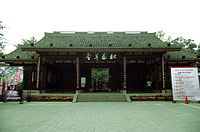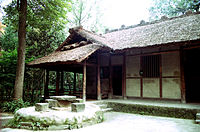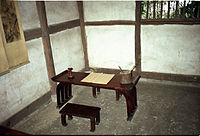- Du Fu Thatched Cottage
-
 Entrance gate of Thatched Cottage of Du Fu in Chengdu
Entrance gate of Thatched Cottage of Du Fu in Chengdu
Du Fu Thatched Cottage (Chinese: 杜甫草堂; Pinyin: Dù Fǔ Cǎo Táng) is an idyllic 24-acre (97,000 m2) park and museum in honour of the Tang Dynasty poet Du Fu at the western outskirts of Chengdu, adjacent to the Huanhua Xi, (Flower Rinsing Creek). In 1961, the Chinese government established Du Fu Cao Tang as a National Heritage site.
Contents
History
In 759 Du Fu moved to Chengdu, built a thatched hut near the Flower Rinsing Creek and lived there for four years. The "thatched hut" period was the peak of Du Fu's creativity, during which he wrote two hundred and forty poems, among them: "My Thatched Hut was torn apart by Autumn Wind" and "The Prime Minister of Shu."
A Quatrain, one of the poets well known pieces written at the cottage in 764, describes the surrounding scenery:
A pair of golden orioles sings in green willows
a column of snowy egrets flies off in blue sky
my window contains peaks with a thousand years of ice
my gate harbors boats from ten thousand miles downriver[1]Du Fu Cao Tang is now a popular destination for Du Fu enthusiasts around the world to pay tribute to the great poet.
Museum
The original thatched hut built by Du Fu was destroyed. The key buildings in the Du Fu Cao Tang Park were constructed in the early 16th century during the Ming dynasty and extensively renovated in 1811 during the Qing dynasty.
Du Fu Cao Tang consists of several main areas:
- Du Gong Bu memorial Hall (Du Gongbu ci), where the life and work of Du Fu was displayed, the library area displayed published works of Du Fu, including some rare Song dynasty wood carving editions. The foreign language section displays a large number of foreign language books of Du Fu's works.
- The Thatched Cottage of Du Fu. A reconstructed thatched hut partitioned into a study, a bedroom and kitchen, recreated the living and working environment of Du Fu's time.
- The Hall of great poets (Da Ya Tang). A new exhibition hall where a 16 long by 4 meter tall mural painting portraying scenes from Du Fu's poems: "My Thatched Hut Wrecked by the Autumn Wind" and "A Song of War Chariots". There are also statues of twelve prominent Chinese poets (including Qu Yuan, Tao Qian, Li Bai, Wang Wei, Su Shi, Li Qingzhao, Lu You) on display.
See also
- Chinese architecture
- List of museums
- Museums in China
References
- ^ Red Pine. Poems of the Masters, p. 100. Copper Canyon Press 2003.
External links
Categories:- Museums in China
- Parks in China
- Buildings and structures in Chengdu
Wikimedia Foundation. 2010.



